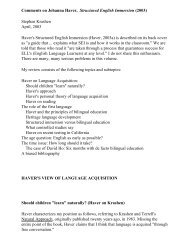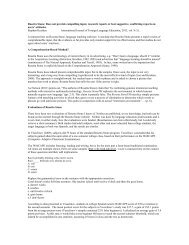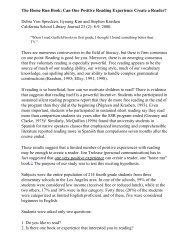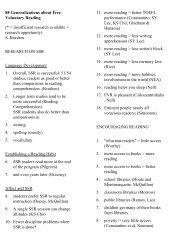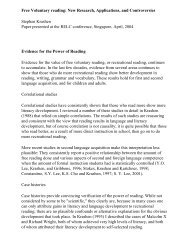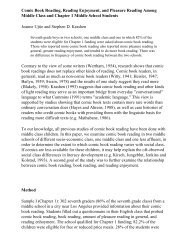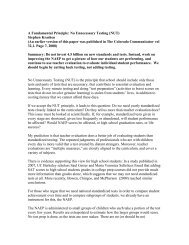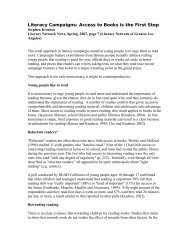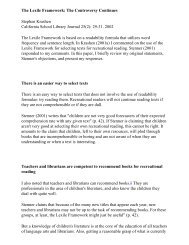Second Language Acquisition and Second ... - Stephen Krashen
Second Language Acquisition and Second ... - Stephen Krashen
Second Language Acquisition and Second ... - Stephen Krashen
You also want an ePaper? Increase the reach of your titles
YUMPU automatically turns print PDFs into web optimized ePapers that Google loves.
language (some similarities to first language acquisition have been noted as well).<br />
When second language speakers "monitor", when they focus on form, this "natural<br />
order" is disturbed. The appearance of child-like errors in Monitor-free conditions is<br />
hypothesized to be a manifestation of the acquired system operating in isolation, or<br />
with little influence of the Monitor.<br />
Current research in the "morpheme studies" supports the hypothesis that second<br />
language performers utilize the conscious grammar extensively only when they have<br />
to do extreme "discrete-point" grammar tests, test that test knowledge of rules <strong>and</strong><br />
vocabulary in isolation.<br />
Also included in Chapter 4 is a response to some criticisms of the morpheme studies.<br />
Material in Chapter 4 was previously published in Gingras (<strong>Krashen</strong>, 1978b) <strong>and</strong> in a<br />
paper appearing in On TESOL '77 (<strong>Krashen</strong>, 1977a).<br />
The Role of the First <strong>Language</strong><br />
Chapter 5 deals with so-called first language "interference". It attempts to provide<br />
some empirical data for a position first held by Newmark (1966): "interference" is not<br />
the first language "getting in the way" of second language skills. Rather, it is the<br />
result of the performer "falling back" on old knowledge when he or she has not yet<br />
Fig. 2. First language influence in second language performance.<br />
acquired enough of the second language. In terms of the Monitor performance model,<br />
interference is the result of the use of the first language as an utterance initiator: first<br />
language competence may replace acquired second language competence in the<br />
performance model, as in Fig. 2.<br />
From the data we have so far, this hypothesis correctly predicts that those aspects of<br />
syntax that tend to be acquired are also those that show first-language-influenced<br />
errors in second language performance.<br />
7



